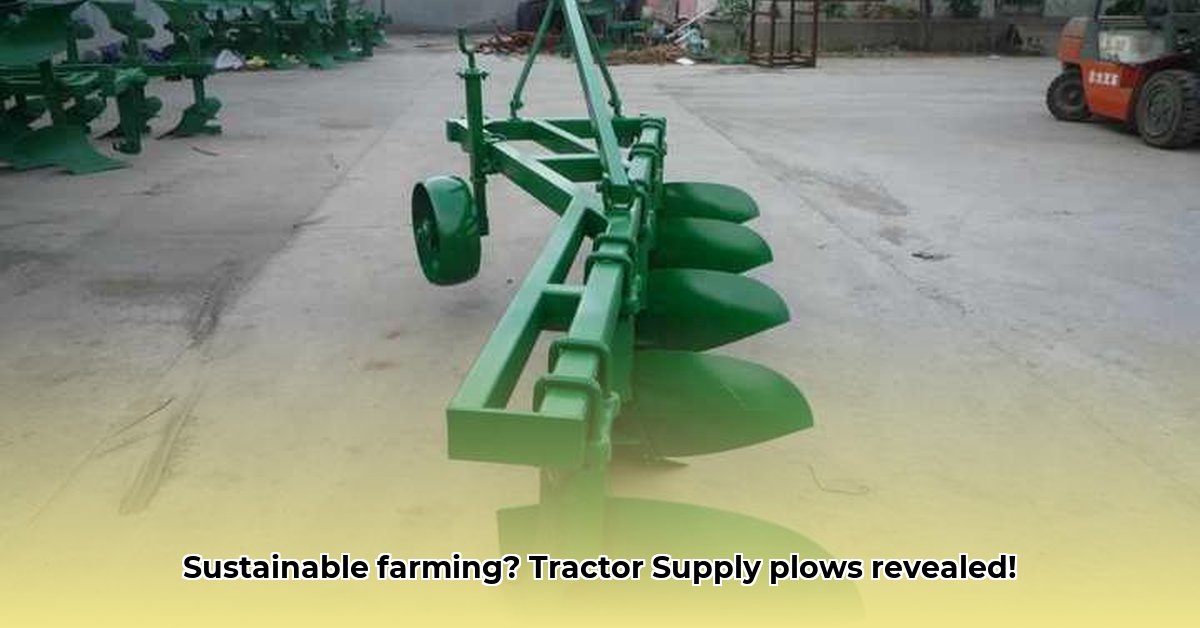
Plows at Tractor Supply: Your Guide to Sustainable Soil Preparation
Choosing the right plow is paramount for sustainable farming practices. Effective soil preparation is crucial for healthy crops and optimal yields, minimizing environmental impact. Tractor Supply offers several options, and this article focuses on the CountyLine 40-inch 2-Bottom Plow, assessing its suitability for small-scale, sustainable agriculture. For more plow options, check out this helpful resource.
CountyLine 2-Bottom Plow: A Detailed Analysis for Small-Scale Farmers
The CountyLine 2-Bottom Plow, readily available at Tractor Supply, presents an attractive option for budget-conscious farmers and gardeners. Its affordability and accessibility make sustainable farming more attainable. But does its performance and environmental impact align with sustainable agricultural principles? Let's delve deeper.
Affordability and Accessibility: Sustainable Farming Within Reach
The CountyLine plow's primary advantage lies in its accessibility at Tractor Supply and its likely competitive pricing. This makes sustainable practices more achievable for smaller-scale operations, who are sometimes limited by high equipment costs. However, it's crucial to check the current price at your local Tractor Supply store before committing to a purchase.
Performance: Efficacy in Soil Preparation
Designed for use with a 40-horsepower tractor, the CountyLine plow is ideally suited for smaller farms, gardens, and other smaller-scale projects. Its effectiveness will vary depending on soil type and moisture levels. While adequate for lighter soils, it may struggle with heavier clay or rocky terrains. Isn't efficient soil preparation a critical component in sustainable yields?
Sustainability Assessment: Environmental Considerations
Sustainable agriculture demands minimizing environmental impact. The CountyLine plow's fuel consumption is undeniably tied to the tractor's efficiency and usage. A 40-horsepower tractor, even a fuel-efficient model, contributes to greenhouse gas emissions. Furthermore, the sustainability of the plow's manufacturing process needs further investigation. What materials were used? Are they responsibly sourced and recyclable? These questions directly impact its overall environmental footprint. Integrating sustainable tillage techniques, such as cover cropping or no-till farming, can mitigate some of the environmental impacts.
Durability and Longevity: A Look at Lifespan and Warranty
The CountyLine plow's all-steel construction suggests reasonable durability. However, the one-year warranty indicates a potentially shorter lifespan compared to some competitors. Diligent maintenance—regular cleaning, lubrication, and proper storage—is essential for extending its useful life and minimizing the need for frequent replacements.
Comparing the CountyLine to Alternatives: A Balanced Perspective
The CountyLine plow offers a reasonable mid-range option. Larger operations might require more robust, higher-horsepower plows, while very small gardens may benefit from simpler, hand-operated tools. The optimal choice depends on farm size, budget, and long-term sustainability goals. Is there a more cost-effective solution for your specific needs?
Conclusion: Making the Right Choice for Your Sustainable Farm
The CountyLine 2-Bottom Plow from Tractor Supply presents a viable option for smaller farms and gardens prioritizing affordability and accessibility. However, potential buyers should carefully consider the plow’s limitations, including its fuel consumption, warranty, and potential performance issues in challenging soil conditions. Thorough research, including comparing it to alternatives, is vital before making a purchase. Remember, responsible soil preparation is essential for sustainable agricultural practices.
Key Takeaways:
- The CountyLine plow balances cost-effectiveness with accessibility for smaller farms.
- Its effectiveness is tied directly to the type of soil and the overall farming practices.
- Longer-term sustainability requires a holistic approach considering fuel usage and responsible material sourcing.